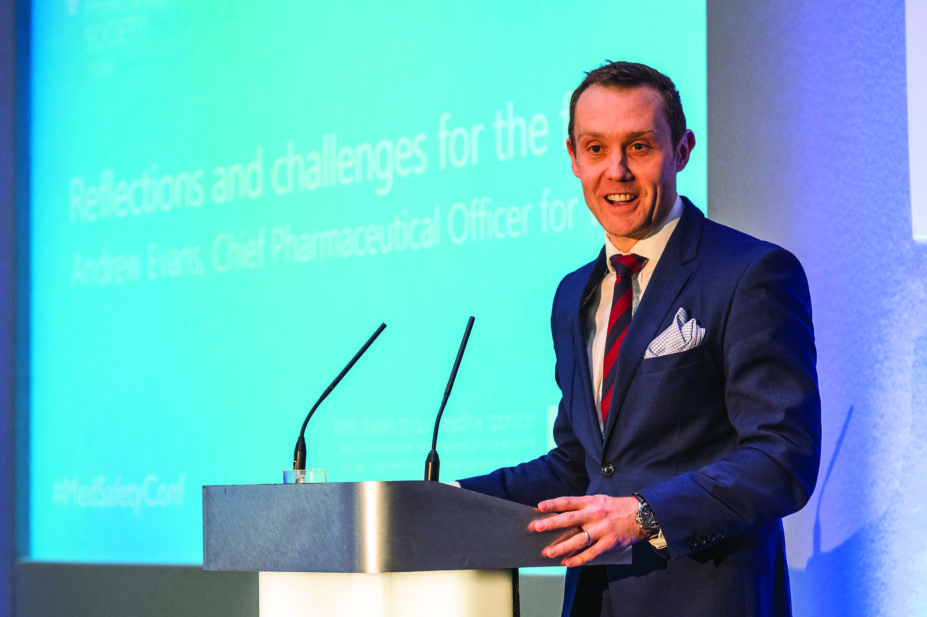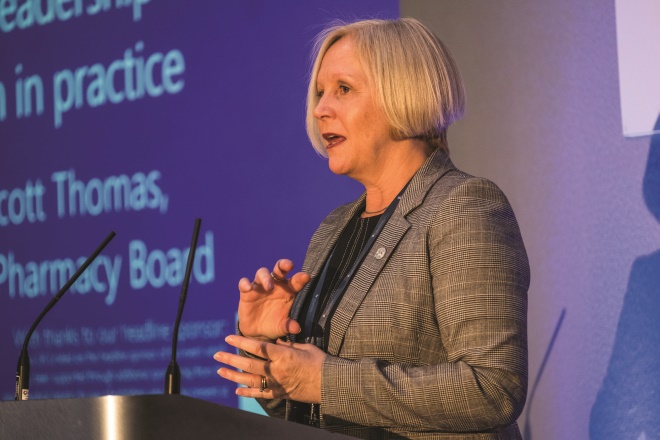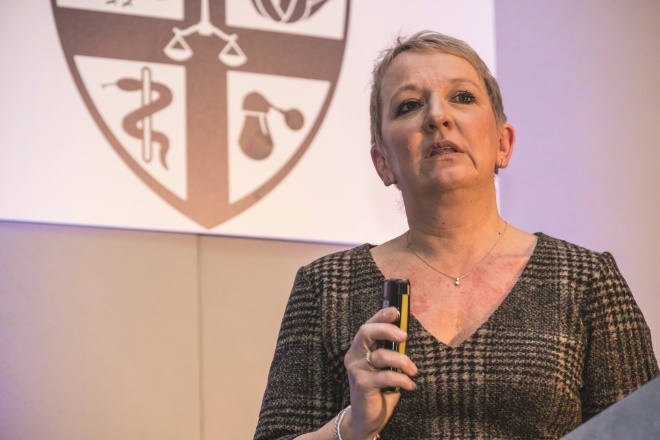
Nick Treharne
Welsh pharmacists will soon be able to access the Welsh GP record, Vaughan Gething, Welsh cabinet secretary for health, wellbeing and sport told delegates at the 7th RPS Medicines Safety Conference on 29 November 2017.
Access will begin in the week beginning 11 December 2017 with a pilot project in four pharmacies.
“If successful, as we wish and expect it to be, that will be extended to all pharmacies with access to the Choose Pharmacy IT system from March next year”, Gething said.
This year’s conference, held at the Vale Resort, Hensol, south Wales, and chaired by Chris Martin, deputy chair of the Bevan Commission, which advises the Welsh government on healthcare issues, was on the theme of ‘innovation to practice’. Following Gething, the theme of innovation was further picked up by John Watkins, consultant in public health medicine and clinical senior lecturer in epidemiology at Cardiff University. A qualified pilot, Watkins posed the question: what can the aviation industry teach us about innovative approaches to safety in medicines? Watkins highlighted two aspects of the aviation safety industry in particular: first, aviation fosters a ‘no blame’ culture for pilots and second, allows for a confidential system of ‘near-miss reporting’.
Watkins also suggested that the NHS can be considered as an organism: a complex adaptive system within which human behaviour is an emergent form. If we want to improve safety, Watkins said, we must “deal with the ecology: if you try to micromanage everything, you will be unsuccessful”.

Source: Nick Treharne
Suzanne Scott-Thomas, chair of the Welsh Pharmacy Board, said that the connectivity afforded by investment in technology enabled pharmacists to use their skills in “every area of the patient pathway”
Suzanne Scott-Thomas, chair of the Welsh Pharmacy Board, highlighted the RPS’s championing of innovation in technology. As a result, she said, there had been significant investment in technology to underpin continuity in patient care. “We need to wrap ourselves around the patient — and that connectivity enables us to fully utilise pharmacists’ skills in every area of the patient pathway”. Scott-Thomas added that the RPS “commits to working with members across Wales to identify innovative practice that can be replicated more widely.”

Source: Nick Treharne
Judith Vincent, chair of the All Wales Chief Pharmacists’ Group, stressed that medicines management should focus on patients in care homes and reducing polypharmacy
Judith Vincent, chair of the All Wales Chief Pharmacists’ Group, shared some priorities for medicines management in Wales, which includes the reduction of harm, a focus on patients in care homes, and addressing necessary polypharmacy. Vincent discussed the importance of modernising the pharmaceutical workforce: “We need to develop capacity through more collaboration and greater use of technology”.
Vincent concluded by re-emphasising the need for collaboration in innovation: “If you want to go fast, go alone. If you want to go far, go together.”
Philip Routledge, clinical director of the All Wales Toxicology and Therapeutics Centre, shared the arresting World Health Organization (WHO) statistic that, annually, $42bn is estimated as the global cost associated with medication errors: almost 1% of total global health expenditure.
Routledge also presented the award for the best conference poster, which this year went to Lloyd Hambridge, practice clinical pharmacist with Aneurin Bevan University Health Board. Hambridge’s poster described his work to increase uptake of the yellow card reporting system across the health board by promoting pharmacovigilance within primary care clusters.
Chris Jones, chair of Health Education Improvement Wales (HEIW), a new Welsh government body, outlined its vision and objectives. He encouraged all pharmacists to identify as clinicians, saying: “Some clinicians express themselves through research: others, in the day-to-day work of helping people”.
Two parallel afternoon sessions gave delegates the opportunity to explore innovation in workforce design and practice development, and the use of science and technology for patient benefit.
In the former session Thomas Cox, lead pharmacist at the UK’s largest prison, HMP Berwyn, described how new technology, including automated and secure medicines storage cabinets with built-in audit trails, can free prison pharmacists to perform more patient-facing activities. Providing the best service to inmates is clearly important to Cox, who considers medicines optimisation to be part of the larger system of rehabilitation.
In the latter session, Jayne Lawrence, head of the division of pharmacy and optometry at the University of Manchester and former RPS chief scientist, spoke about advances in personalised medicine. While these may be expensive, Lawrence said, increasing evidence suggests that they deliver longer-term savings. In the same session Harvinder Sondh, director of marketing and product development at Pharmaceutical Press, demonstrated the newly redesigned Medicines Complete online platform and explained how RPS support tools can assist in complex medicines decision making.
In the afternoon, delegates heard from a special guest: Olympic gold medallist Sally Gunnell, who drew on her personal experience of resilience in the face of great challenges. Positive visualisation of success in all potential scenarios and the support of a good mentor were, she said, invaluable in helping her to overcome pressure in the build-up to the 1992 Barcelona Olympics. Gunnell’s presentation would, RPS Wales said, provide a kick-start to the Society’s 2018 focus on workplace pressures. RPS Wales aims to support and equip members with the capacity to look after themselves so they can best look after others.
Towards the end of the day Andrew Evans, chief pharmaceutical officer for Wales, took the stage and offered three challenges for delegates.
First, he said, learn to do things differently: listen to others, both within and outside the sector, to explore alternative ways of working. Second, he said, pharmacists must work together and all think about how collaboration can improve medicines safety. Finally, he said, it was time to be ambitious.
“The scale of the problem is so great that the WHO have made improving medicines safety their third global challenge,” he said.
“In the face of such a monumental task, being polite and understated just won’t do.
“Let’s think big, and act now.”

